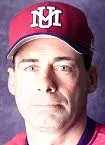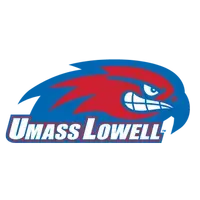University of Massachusets Athletics

Q & A With Baseball Head Coach Mike Stone
April 28, 2000 | Baseball
April 28, 2000
Maroon and White staffer Blayne Fielder recently sat down with UMass head baseball coach Mike Stone to discuss the UMass program and baseball in general. Earlier this season, Stone collected his 400th career win and his 350th at UMass. He has led the Minutemen to six straight A-10 regular season titles, two A-10 Tournament titles and two NCAA Tournament appearances. In his 13 seasons at UMass, Stone has sent 28 former Minutemen into professional baseball including current major leaguers Gary DiSarcina, Dave Telgheder and Ron Villone.
M&W: Now in your 13th season at UMass, what has been the biggest highlight of your coaching career?
MS: Going to the regional championship finals versus Florida in 1996. That team won 40 games that year including a come from behind win over South Florida to advance to the regional final, scoring three runs in the ninth to win that game. We've had some great moments, but that is the one that really sticks out the most.
M&W: Many of the successful teams on campus recruit athletes from around the nation and even different countries, but the UMass baseball program has been successful primarily with players from the New England region. Has this been a point of emphasis for the UMass program?
MS: We really don't have much choice because of scholarship limitations and the cost of out-of-state tuition when compared to in-state tuition and the regional plan. When you try to convince athletes to come who are very good players, they want scholarship money or at least pay less than what they would have to somewhere else, so it's tough. On the other hand, we've been really fortunate to get quality players from the region. There are a lot of kids who may not get recruited nationally, but still want the opportunity to play baseball in a quality program and we've been fortunate to get those players. We have 28 players on our roster from Massachusetts, and we've also done real well with western Massachusetts players. You have to do the best you can with what you're dealt with. Our program wouldn't survive without the kids from New England, Massachusetts and western Massachusetts.
M&W: After graduating from high school, you signed a contract with the Cardinals and played five seasons of pro ball. If you could go back and make that decision again, would you do the same thing?
MS: Probably not, from a maturity standpoint. I would have been better off going to college and developing on a more gradual basis, but when you're faced with that decision it's tough. It's something you've always wanted to do, you've always dreamt about playing and you think you can be successful doing it. It took me three plus years to mature enough to handle the day-in, day-out pressure of getting yourself ready to play.
M&W: What kind of advice would you offer to a prospect when trying to make the decision of whether or not to turn pro or go to college?
MS: Through my own experience, I think I've gotten a feel on whether or not someone would be ready physically, emotionally and mentally to be a successful player. Regardless of where you're drafted, how much money you're offered, you need to go in to pro baseball in a situation where you're mature enough physically and emotionally to be successful now. That's why I've advised some players in the past not to sign out of their sophomore or junior seasons. It doesn't do the player any good to play professionally if they aren't ready to be a successful player. I learned that from my experience and it was a rude awakening for me.
M&W: Every year to kick off the season, you take your team south to play some of the nation's top teams. How important is the trip in preparing your team for the conference and postseason?
MS: You play in good ballparks in front of fans, you see good pitching and good players, you see a certain level of play that we need to play at in order to have a good team and compete on the national level. It sets a standard for our players to reach for, and if you have a chance to knock off one of those teams it's just icing on the cake.
M&W: With the expansion of the NCAA Tournament field to 64 from 48 teams two years ago, what kind of opportunities does that present for a team like UMass?
MS: You would think it would help, but there's a lot of good teams out there. There were a lot of teams that ranked highly in the SEC, like Florida, who didn't make the tournament field last season. A number of good teams didn't make it. You would think that it would present an opportunity for some different teams to advance, but maybe it's just expanded for more teams in the ACC, SEC, PAC-10 and those larger profile conferences rather than for teams in the northeast. Last year I didn't notice any more northeast teams than in previous years. In theory, it's supposed to help schools like UMass, but I don't think it worked that way.
M&W: You've sent 28 players into professional baseball since coming to UMass, including several major leaguers. That must be a point of pride for your program.
MS: It gives you instant credibility when you talk about the players that have gone on to successful pro careers. We can show that we have developed players that are good enough to go on and play professional and in major league baseball. There are a lot of programs out there who would like to be able to say that, and we've proved that it can happen here.
M&W: There are several college baseball programs in the north that have been dropped due to budget cuts. Are there any solutions to this problem?
MS: That's a tough question because there have been programs in the Northeast that were good that were dropped, that were average and dropped, and that were poor and dropped. Because we do play in the spring and weather is a factor, it makes it easier for the people making the decisions to look in our direction. I don't think any sport should be dropped, especially those sports that don't offer an opportunity to play beyond college. I think it's a shame to prevent a whole group of kids from playing a sport. After college, there aren't many options to play baseball unless the kids are fortunate enough to develop and play professionally. I don't think any sport should be victimized like that. By having a successful program, maybe it would make it harder to cut, but that isn't always the case.
M&W: What is your view on the recent offensive explosion that has changed both the college and pro game over the last few years?
MS: I think the problem in the major leagues is the strike zone, which is about the size of a volleyball. In college, it was the evolution of the aluminum bat. Last year, with the change in bat specifications, the number of home runs went down significantly. Before last season it was a performance race between Easton and Louisville, the two biggest bat manufacturers. It's good to have some offense, people definitely like to watch the offensive game. Everyone likes to see home runs and balls hit to the warning track, but I think we're getting back to where we should be. It certainly shouldn't be a safety issue, where pitchers are at risk while on the mound.
M&W: What's the biggest difference in the game now compared to when you were playing?
MS: My senior year in high school was the first year that we had aluminum bats. Those first aluminum bats acted and sounded like wood bats so it was an easy adjustment. The reason why people used aluminum was to save money and then it got out of hand with the performance race. Now the bats are costing $300. Speed is definitely more of a factor now. We've always tried to play guys who can run and know how to steal bases and make things happen offensively. The short game is used less now than in the past and breaking pitches are much more common than they used to be. More kids are throwing sliders, splitfingers and changeups now. You used to see mainly fastballs and an occasional off-speed pitch.
M&W: With all the money involved in pro sports and baseball in particular, how do you think that has or can potentially affect the college game?
MS: I think that pro baseball has wasted a lot of money on signing bonuses over the past 10 years drafting kids after their sophomore or junior seasons. I'd like to see the draft rules changed, allowing teams to draft a player after their junior season but letting them come back and compete as a senior. They should use the money on players that have already gone out and proven themselves instead of taking risks on people who really haven't done anything yet. I'd also like to see scholarships revamped in the colleges too. I'd like to see kids get money for what they do in college, rather than what their potential is coming out of high school. It would be a drastic change but I like the idea of players earning their scholarships on the field as opposed to an enticement to getting a player to attend a certain school.
M&W: How have your coaching methods changed from when you started almost 20 years ago?
MS: I was probably a lot more intense when I was younger because you're always trying to prove yourself as a young coach. Until you find that peace of mind, you're probably not as patient as you hope to be until you feel comfortable with yourself. It takes a while until you feel like you're doing a pretty good job and you're on the right track to being a successful coach.
M&W: What do you attribute the program's success to here at UMass?
MS: It's a good place to coach because you have good kids, you have people who buy into what you're trying to accomplish. We've been fortunate enough to convince people that what we're doing works, and we've seen evidence of that. I feel very fortunate to have the opportunity to work with the kind of kids that we have here, that's what makes UMass a great place to coach. We have hard-nosed kids who are mentally tough, work hard physically and are quality people. All of our good teams have had that in common. The team's may be different in a lot of ways, but we've always had good, hard-working people, and that makes a difference.



